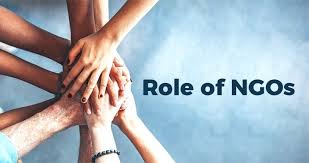
Introduction
Non-governmental organizations (NGOs) were first included in Article 71 of the newly constituted United Nations Charter in 1945. While there is no established or formal definition for non-governmental organizations (NGOs), they are often characterized as nonprofit institutions free of government interference.
As the fundamental description above indicates, there is little distinction between nonprofit organizations (NPOs) and non-governmental organizations (NGOs). However, nonprofit organizations located in the United States are rarely referred to as "NGOs." In general, the term "NGO" refers to international organizations, while some countries categorize their own civil society groups as NGOs.
Furtherly, NGOs are private organizations that pursue activities to relieve sufferings, promote the interests of the poor people, protect the environment, and provide health, educational facilities, and other developmental programmes. NGOs are non-profit making organizations they are independent from government, they are not directly affiliated with government. They create a remarkable impact on the socio-economic and political activity of people. They are value-based organizations which depend in whole or in part on charitable donations and voluntary service. NGOs include many groups and institutions that are entirely or largely independent of government and that have primarily humanitarian or cooperative rather than commercial goals.
The Roles of NGOs in The Society
a) Advocate for a Better World.
Non-governmental organizations (NGOs) play an important role in campaigning for social change and influencing laws and legislation affecting the communities they serve. They promote awareness on vital problems such as human rights, environmental protection, and social justice through advocacy activities, with the goal of achieving systemic change that improves people's lives on a larger scale.
b) Grassroots Mobilisation: Empowering Communities
NGOs organize communities at the grassroots level, providing individuals with knowledge and skills to campaign for their rights and interests. This bottom-up strategy guarantees that minority perspectives are heard, promoting a culture of tolerance and diversity.
c) Humanitarian Aid: Providing Critical Support
In times of disaster, non-governmental organizations (NGOs) provide humanitarian help, such as food, housing, medical care, and psychological support. Their adaptability and fast responsiveness make them more effective help providers than larger institutions.
d) Community Development and Empowerment.
NGOs drive community development projects that improve people's quality of life, such as school construction, healthcare facility improvements, and vocational training. By focusing on empowerment, NGOs assist communities in becoming self-sufficient and sustainable.
e) Contributing to the Sustainable Development Goals (SDGs)
NGOs make major contributions to attaining the United Nations' SDGs, which address global concerns such as poverty, inequality, climate change, and peace. They tailor programs to line with these ideals, contributing to a worldwide drive for sustainable development.
f) Education and Capacity Building: Improving Communities
Education is a cornerstone of NGO activities, providing opportunities for children and adults, lowering illiteracy rates, and equipping people with necessary skills. NGOs use capacity-building workshops to boost other civil society organizations, increasing their influence and efficiency.
The Impact and Effectiveness of Nonprofit Organizations (NPOs) in Our Society
The impact of NPOs on Nigeria's social and economic development is substantial, though it varies across sectors and regions.
a) Positive Outcomes:
NPOs have clearly filled essential gaps in service delivery, especially in places where government resources are limited. Their work in health, education, human rights, and economic empowerment has significantly improved the lives of millions of Nigerians.
b) Limitations:
However, the aforementioned issues can restrict the overall efficacy of NPOs. Furthermore, a lack of collaboration between NPOs and the government might result in inefficiencies and missed possibilities for synergy.
c) Long-Term Development:
For NPOs to have a long-term impact on Nigerian development, they must prioritize creating local capacity, fostering relationships with government and private sector stakeholders, and guaranteeing program sustainability.
Conclusion
The role of an NGO in society is complex and far-reaching. These organizations are vital for driving social change, providing humanitarian aid, developing communities, and advocating for the rights and welfare of populations worldwide. As agents of progress, NGOs contribute to a more informed, empowered, and equitable society, making them indispensable partners in the quest for a better future.
Understanding the role of NGOs is just the beginning. To truly appreciate their impact, one must look at the tangible differences they have made in the lives of countless individuals around the globe.


